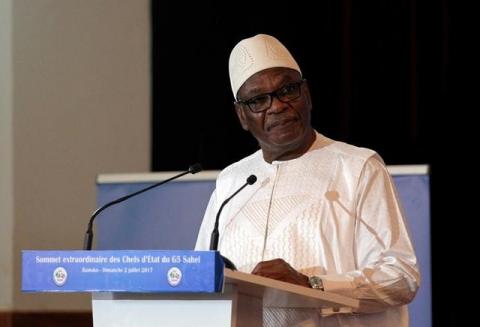Advertisement
Thousands march against referendum, extra powers for Mali president
BAMAKO (Reuters) - Thousands of Malians took to the streets on Saturday to protest against a planned referendum on constitutional changes that would give extra powers to President Ibrahim Boubacar Keita, create new regions and recognise the Tuareg's ethnic homeland.
Mali's government has delayed the vote, which was originally planned for last week, but still plans to go ahead with it this year. Activists are unsettled by provisions that would enable the president to nominate a quarter of the Senate and remove the prime minister at will.
Malians have become increasingly disillusioned with Keita's government, as insecurity has worsened significantly over the past year and is spreading beyond the desert north to the south and centre, including the capital Bamako.
"We don't need a revised constitution. We need the state to liberate the north and centre of Mali and to take account of people's aspirations," protester and local councillor Sonore Sidibe said at the march, where protesters held up placards saying 'no' to the constitution, and some brandished red cards and called for the president to resign.
Presidential elections are scheduled for late 2018, although Keita has not said whether or not he will run.
The constitutional changes concerning new regions are supposed to happen as part of a 2015 peace deal aiming to end the separatist Tuareg movement. It will also recognise their claims to a degree of autonomy by officially labelling the northern desert regions by their Tuareg name, 'Azawad'.
Some Malians are angered about concessions to the rebels, whose 2012 uprising enabled allied jihadists to take over parts of the north and use them as a launch pad for regional attacks. French forces intervened and scattered the Islamists and Tuareg rebels the following year.
"This constitution is heading towards federalism," said demonstrator Moussa Ouattara. "That's a victory to the separatists who want an Islamic Republic of Azawad".
The peace deal has so far failed to quell unrest in the north, where rival pro and anti-government factions are locked in a violent power struggle.
(Additional reporting by Adama Diarra; Writing by Tim Cocks; Editing by Ros Russell)



















Add new comment